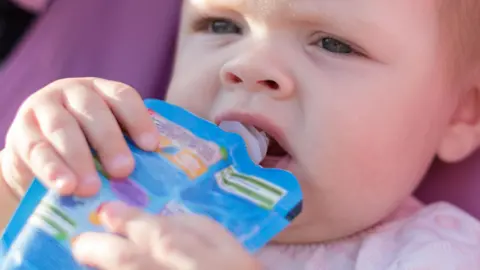Campaigners call for urgent action over unhealthy baby food
 Getty Images
Getty ImagesHealth organisations have urged the government to take immediate action to protect babies and children from nutritionally poor, sugar-laden food.
The Obesity Health Alliance (OHA) said children "face relentless exposure to unhealthy food" and called for stronger regulation of the baby food market.
It follows an investigation by BBC Panorama which found baby food pouches from six leading UK brands failed to meet their key nutritional needs.
The government has previously said existing laws already ensure the safety and quality of baby foods and the claims made on packaging are clear and accurate.
The government has announced several measures to tackle childhood obesity, including restrictions on junk food advertising on TV, takeaways opening near schools and a ban on multi-buy promotions.
But the OHA - a coalition of 40 leading health organisations - said with a rise in childhood obesity, tooth decay and type 2 diabetes, now is the time to ensure children and parents are not exposed to misleading marketing of food and drinks.
It also said there should be mandatory sugar limits on baby food and drinks, more schemes to help low-income families access healthy, affordable food and sugar warnings on food labels.
"Without urgent intervention, we face the very real prospect of a generation growing up with worse health outcomes than their parents," the OHA said in a letter to Health Secretary Wes Streeting.
The letter also warned of "a worsening health crisis", with more children shifting from a healthy weight to being overweight or obese while at primary school, particularly in poorer areas.
The BBC Panorama programme, The Truth About Baby Food Pouches, tested 18 baby food pouches made by leading brands in an approved lab.
Many were found to be low in vitamin C and iron, while some contained more sugar in a single pouch than a one-year-old should have in a day.
Its investigation also found:
- Savoury pouches, used by some families as replacements for main meals, containing less than 5% of the key nutrient, iron, that an infant needs each day
- A fruit pouch in which virtually all the vitamin C had been lost during the manufacturing process
- Fruit pouches marketed as having "no added sugar" containing about four teaspoons of so-called "free sugars" (created when fruit is blended) - something that experts say is "intentionally misleading"
- Pouches being marketed to babies as young as four months old, against the clear recommendations of the UK government and the World Health Organization (WHO)
The NHS says an infant should have as little sugar as possible, and that a one-year-old child should have no more than 10g of free sugars a day.
Free sugars occur when fruit is pureed, as is the case with the pouches. Eating pieces of fresh fruit is much better for children.
OHA director Katharine Jenner said: "The evidence is clear: children's health is being compromised from the very start of life.
"Given industry has failed to act voluntarily, it's now time for government intervention to protect the next generation and grant every child a healthier start."
She said from the moment babies are born, they are are bombarded with sugary, highly processed foods.
"It's fuelling a health crisis that starts in infancy and is almost impossible to undo later in life. Ignoring the issue is no longer an option," she added.
In recent years, governments have brought in policies to help improve people diets.
A sugar tax on soft drinks was introduced in 2019 and has helped removed huge amounts of sugar from drinks sold in Britain, according to Public Health England. Milk-based drinks such as lattes and milkshakes may now also be covered by the tax.
In April 2022, hospitality businesses employing at least 250 staff - such as restaurant and café chains - had to print how many calories were in each dish on their menu.
Some supermarkets in England were also stopped from displaying certain unhealthy food and drink in particular areas.
